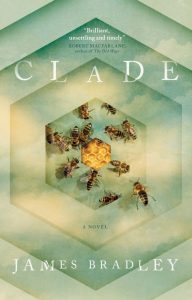CLADE by James Bradley – THE UNSEEN ACADEMIC

This is an occasional series of posts drawing on my excursion into the academic side of creative writing. Having taken a career break from secondary schooling to further my own education with some post graduate study I’ve completed an MA in Creative Writing at Queen’s University Belfast. I’ve now started on a PhD project at the same university with the catchy title “Navigating the mystery of future geographies in climate change fiction.”
So the Hive has kindly given me space to post reviews of climate fiction books as well as blogging thoughts and articles on other aspects of my PhD experience.
This week I’m going to look at Clade by James Bradley
Bradley interrogates key issues of climate change with an episodic multi-perspective structure that reminded me of The Green Road by Anne Enright. Bradley’s narrative spans several decades of world and character change and development but, as with The Green Road, does so by leaping on years at a time and focussing on relatively short periods or particularly significant events within the lives of its various protagonists. The overall effect is of a collection of short stories linked and connected by theme and family. It was only after I’d finished the book that I looked up what “clade” meant on Wikipedia and realised its summative appropriateness to both the text and the characters.
A clade (/kleɪd/;[1][2] from Ancient Greek: κλάδος, klados, “branch”), also known as a monophyletic group or natural group,[3] is a group of organisms that are monophyletic—that is, composed of a common ancestor and all its lineal descendants.
 The book is about Adam Leith and the people connected with (or descended from) him as he travels from a troubled twenty-something climate change scientist of our time to an old man fifty or sixty years in the future (Bradley avoids giving any precise time stamps). It is an entertaining read that makes the most of its diversity of style and setting. At times the tales offer action orientated visceral danger that would suit a Hollywood blockbuster, at others it is a more tense almost political thriller, all of this seasoned with the personal reflections and growth of an intriguing mix of characters.
The book is about Adam Leith and the people connected with (or descended from) him as he travels from a troubled twenty-something climate change scientist of our time to an old man fifty or sixty years in the future (Bradley avoids giving any precise time stamps). It is an entertaining read that makes the most of its diversity of style and setting. At times the tales offer action orientated visceral danger that would suit a Hollywood blockbuster, at others it is a more tense almost political thriller, all of this seasoned with the personal reflections and growth of an intriguing mix of characters.
As with Kim Stanley Robinson’s New York 2140, Bradley wields his multiple viewpoints in tales of different form as well as substance; third person and first person, past tense and present tense, narrative and epistolatory. However, while Robinson’s different perspectives were all tidally locked looking at New York, Bradley’s structure branches in many different directions evoking a broad range of complex climate challenges.
We meet Adam Leith and Ellie as they contemplate prospective parenthood while separated by the Antarctic ocean, Ellie in a fertility Clinic in Australia, Adam celebrating solstice with a group of scientists at a research station. We follow them and their relatives, friends and acquaintances in fragmentary glimpses of troubled parenthood and grandparenthood as the world we know disintegrates.
While the novel’s reach extends across the globe, its focus lies in Australia (which is useful to remember when Bradley refers to one character wearing “thongs” – Australian for flip-flops). It is nonetheless the most complete depiction of climate change I have read to date. The broad sweep of its themes takes in extreme storm weather events, sea-level rise, species loss such as accelerated colony collapse in bees, refugee crisis in a time of political prejudice and suspension of human rights, Australian wildfires, water shortages and power outages. When I got to the section that addresses “the year of the plague” – a respiratory disease originating in China that sparks a global pandemic – the book felt so prescient it was as if Bradley had been writing 2020 in reverse. One character’s description of a pandemic blighted shopping trip resonated with a terrible contemporary familiarity.
“Dr Leith gave me a sharp look and then caught himself again. ‘All right,’ he said. ‘If you insist. Just don’t touch anything. And make sure you keep your masks on.’”
When our current lived-experience as readers is already so locked into one of Bradley’s grim forecasts it lends a certain credibility to the others. Adam voices the frustration of the scientist at humanity’s genetic and political reluctance to engage with evidence and reality.
“We don’t change because we don’t believe in the problem… at least not at the deep intuitive level we need to. We can see it when it’s in front of us, see what it means; we know we have to change. But as soon as we’re away from it our old thinking re-asserts itself. Our desire to reproduce, to build power.”
When a climate change denying politician is given airtime
“Adam watches with fury boiling up in him at the man’s reasonableness, his polished deceit.”
But Bradley skilfully entwines the political and the personal, as Ellie accuses him
“I think you get off on being angry. Sometimes it’s like you want the worst to happen because it will mean you’re right, and the world is fucked.”
With one section heading “boiling the frog” Bradley alludes to the pace of change that we experience, like a frog placed in a saucepan and brought gradually to boil, the initial change is manageable, comfortable even. It is only over an extended period of time that the real catastrophe becomes apparent.
Adam also wrestles as other protagonists have in The Wall and The Last Day on the potential irresponsibility of parenthood in a world in crisis
“Were they really doing the right thing by bringing another life into it”
A thought that haunts him as the struggle for conception turns into “duty sex.” Their own child Summer goes on to wrestle with her parental responsibilities as the mother of a high functioning autistic spectrum disorder son.
Bradley has captured a breadth of issues and characters in what is still a relatively slim volume. I consumed the last half in one late night/early morning sitting of compulsive reading. He world builds the progress of information and biological technology with subtly bleeds into the narrative: Self-driving cars; genetically modified carbon harvesting triffid trees; pervasive IT “screens” and “lenses” by which people escape into “virches” – virtual environments that are the evolution of modern game playing – or which can overlay mundane experience with entertaining filter effects. At the same time references to wars and crop failures, collapsing governments all season the speech and experience of Bradley’s characters.
In his focus on small-scale individual challenges, Bradley succeeds in the opportunity Nickoleris and others identified for climate fiction in Narrating Climate Futures: Shared socioeconomic pathways and literary fiction. Literary geography and speculative fiction can converge in visions of the future, where literature can bring a micro-focus to the world’s macro-challenges.
“Through identification with the protagonists in literary fiction, climate futures become close and personal rather than distant and abstract”
At the same time, entertaining and compelling as Clade is, Bradley seems determined to find hope in the future. The episodic style allows a breadth of issues, but as the story alights on each one and moves on, the true ramifications of each disaster cannot be fully explored. The torment of recovery, the shape of what is left behind is described only in passing such as this line with all its contemporary resonance
“Sometimes when you see the news out of England it’s easy to forget it was once a rich country.”
However, Adam’s family and friends survive. Loss and disaster seem to haunt the periphery of their existence more than inhabit its centre leaving a sense that the consequences of climate change happened to other people, millions of other people maybe, but for Adam’s clade there is a new normal. There is a future still there for some people in an adjusted version of our world, as Bradley’s final protagonist realises
“…this is not an end but a beginning. It is always a beginning.”
Bradley braids global issues around more human ones of life, parenthood and the legacy we leave both in our biological descendants and those we have influenced or who remember us. He gives us a thought-provoking insight into our troubled journey into the future across the span of a single human lifetime. However, we should not be complacent that the ultimate destination is as hopeful or accessible for anyone as Clade might suggest.

